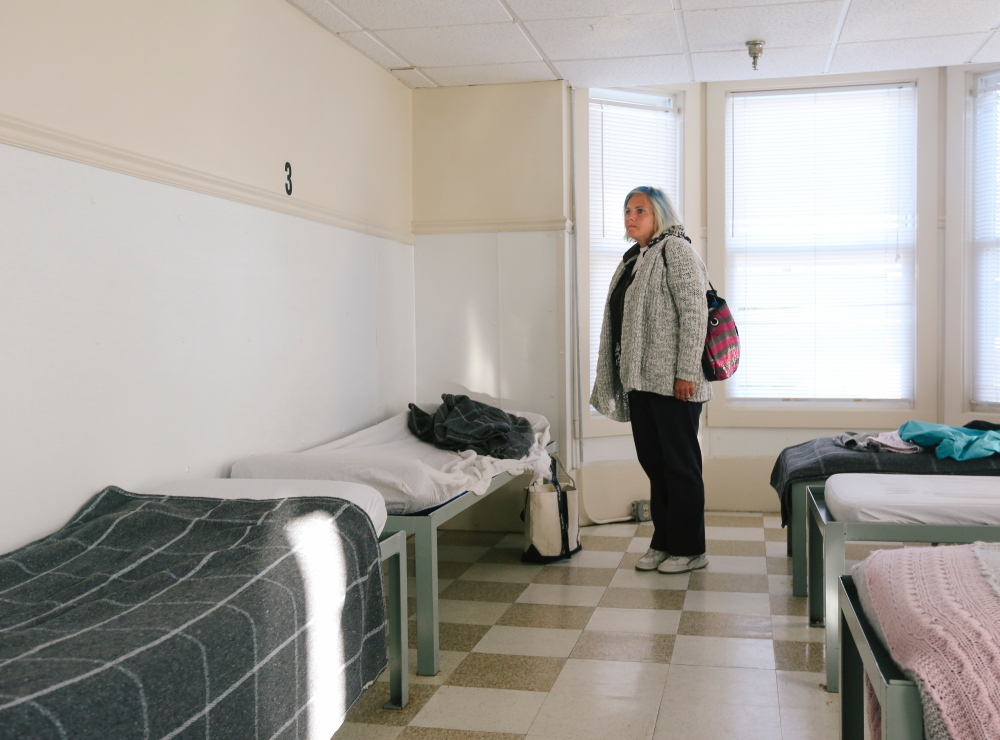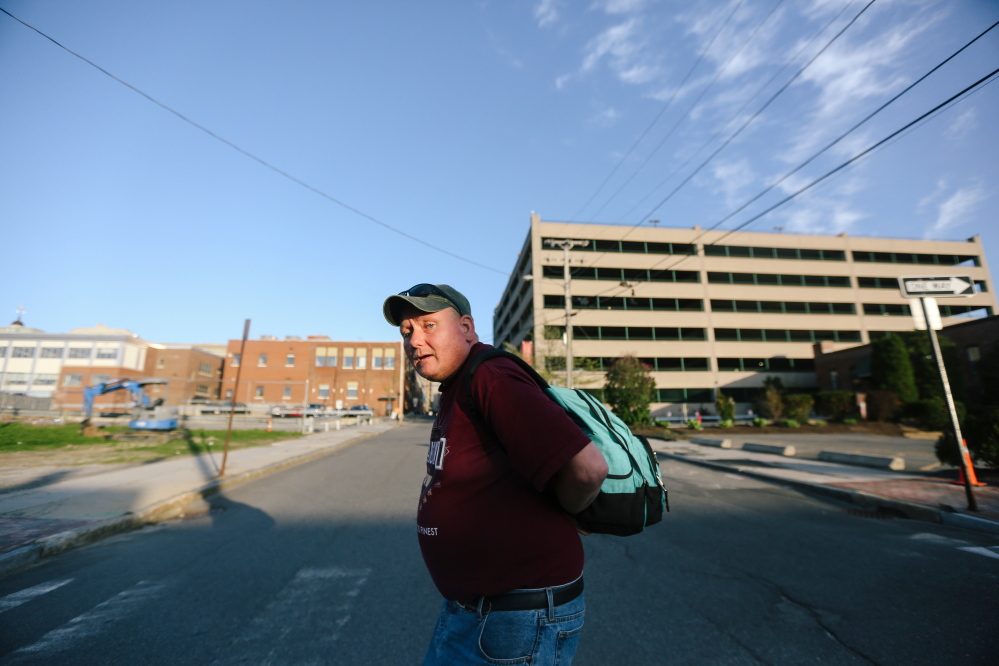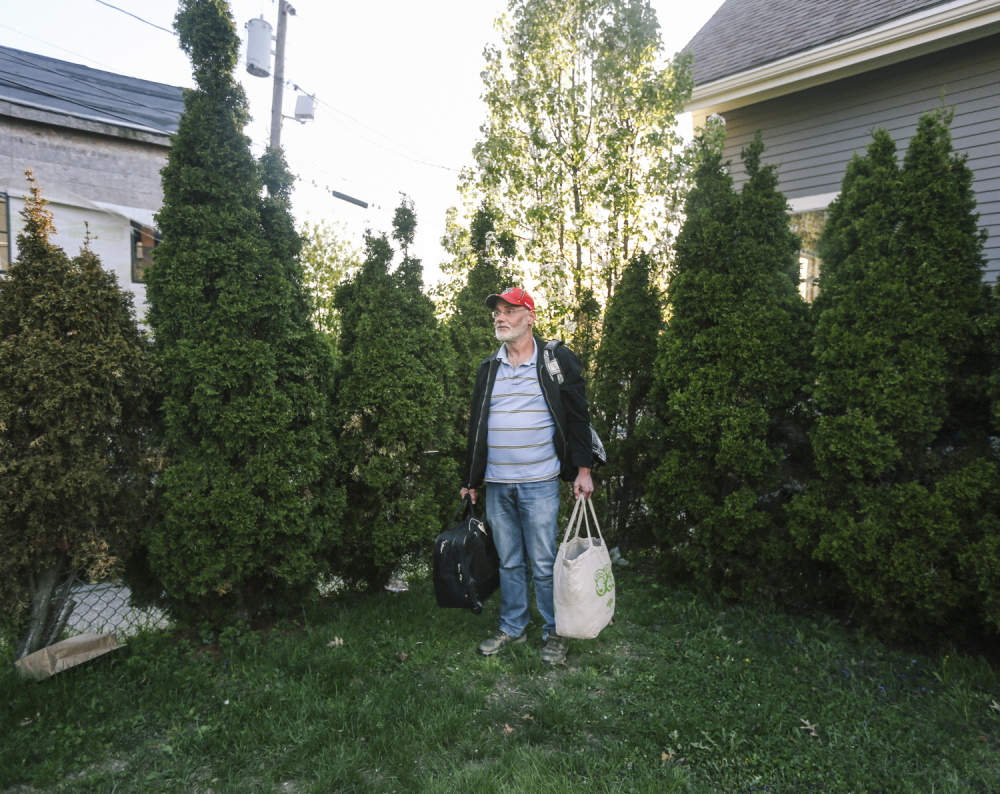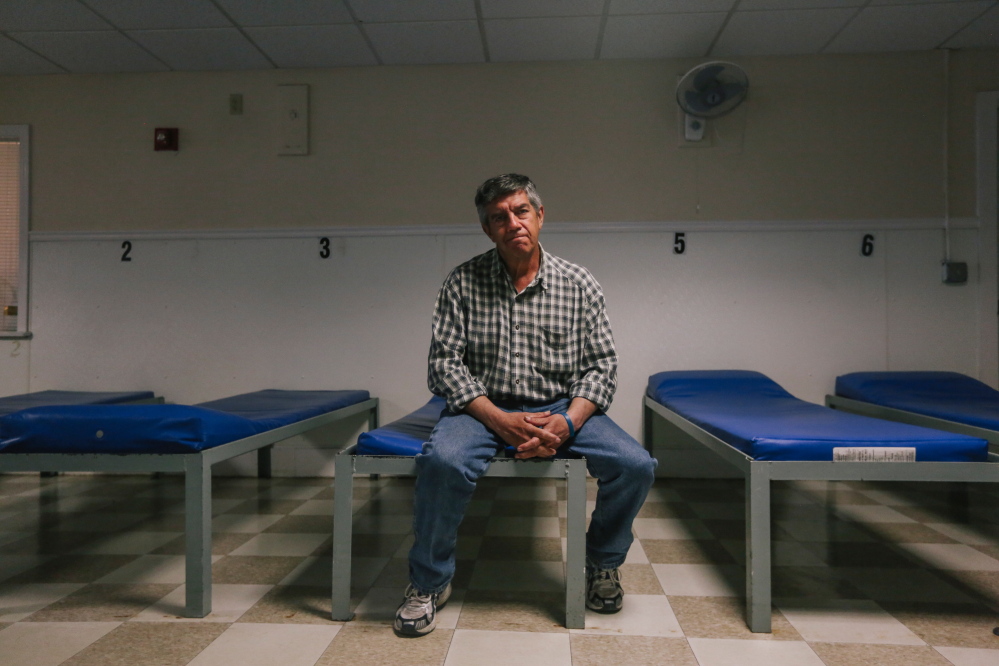Gary Lee checked into the city of Portland’s Oxford Street Shelter on a frigid February evening. He had hit rock bottom after months of heavy drinking and drug use. It was a desperate attempt, he said, to cope with the deaths of his mother, father and grandmother, all of whom died within a year of one another.
The 50-year-old Eastport native lost his job at a Brewer grocery store and his relationship ended. He had been living in a Brewer motel until he exhausted his savings. But Lee said he had cleaned himself up and got counseling after considering suicide. After treatment, a Bangor crisis clinic bought him a bus ticket on Concord Coach Lines. Destination: Portland.
“My whole identity was lost. I slipped into a severe depression,” Lee said on a recent May evening, waiting in line on Oxford Street with dozens of other men and women for a bed at the city shelter. “There was no room in Bangor (shelters) at the time, so they shipped me down here because they know (Portland doesn’t) turn anyone away. This was the only place that was open.”
Lee is among the growing number of people from other Maine towns who are seeking refuge in Portland – the only city in the state to run its own homeless shelter and one of the few to provide low-barrier shelter to anyone in need. Those characteristics may be turning Portland into a dumping ground for homeless people who can’t get shelter or services elsewhere.
A Maine Sunday Telegram analysis of six years’ worth of shelter data shows that 35 percent of people who have stayed at the shelter since 2009 came from a Maine community other than Portland. During that period, the percentage grew from 32 percent in 2010 to 37 percent last year.
What draws the needy to Portland is the subject of intense debate. Welfare critics claim people come to the city for an easy handout, while advocates argue that people simply need a hand up.
But the reason most people come seems to be because they have no other choice.
Some people seem to have been sent here by community service providers or other town officials. Others come here on their own, hoping to find economic and social opportunities that are not available in Maine’s many rural towns. Portland is one of the few urban areas in Maine with a wide array of jobs, including many in the food and hospitality industry. It also has a relatively extensive network of nonprofit social service providers – such as soup kitchens, health care and counseling services – that are not available in most Maine towns.
“I do think that clients are aware of what resources are available here that are not available in their communities but should be,” said Angela Havlin, assistant director of the Oxford Street Shelter.
Steve Hirshon, an active member of the Bayside neighborhood, where the city shelter is located, has heard stories about hand-written messages on bathroom walls at out-of-state Greyhound bus stations, or about police from other southern Maine communities dropping homeless people off in Portland. While those stories may or may not be true, “There is such a dearth of programs that I think people just sort of throw up their hands and send them to Portland,” he said.
Portland is no more generous with welfare than other communities. Although it continues to defy a legally questionable 2014 state decree to cease providing assistance to some types of immigrants, state audits have routinely found the city to be in compliance with state rules governing General Assistance – no-cash benefits that come in the form of vouchers for food, rent, clothing and medicine.
For the last 30 years, Portland has become known as an open and welcoming city that is willing to provide food and shelter to people in need, whether they are from Biddeford or Burundi, Calais or the Congo. But there are tough choices ahead on whether to keep that commitment.
The LePage administration will no longer pay operating costs at the city shelter. Unless a stable source of state funding is approved by the Legislature, the city may have to either cut services, which would put more people on the streets, or ask taxpayers to pay more to preserve services that are increasingly being used by people throughout the region.
Political pressure is growing for Portland to maintain safety net programs, even if state funding evaporates. Mayor Michael Brennan recently predicted that the city budget will fund the emergency shelters, but other councilors aren’t so sure.
“I just don’t think it’s possible for the city of Portland to take over the funding that the state used to provide. We just don’t have the resources,” said City Councilor Edward Suslovic, who chairs the public safety committee and serves on the finance committee.
PORTLAND COULD SHOULDER TAX BURDEN
While Portland’s shelters are increasingly filling a regional need, changes being pursued by the LePage administration may result in city taxpayers shouldering more of the burden. The administration will no longer pay the $2 million in operational costs of Portland’s shelter. As a result, the city is considering closing an overflow shelter that can accommodate 75 people.
Yet Portland taxpayers next year may spend $1 million more on GA, even though the overall budget is expected to drop from $11 million this year to $7.2 million next year. And in future budgets, city taxpayers will have to repay $5 million in surplus funds that may have to be used to make up for a lack of reimbursements during the current fiscal year.
And most of it is going to pay for benefits for people from out of state and other Maine communities.
The Telegram analyzed six years’ worth of intake data from the Oxford Street Shelter, which provides emergency shelter to as many as 141 adults, and found that the shelter is serving an increasingly regional population. Over the last six years, 3,682 out of the 10,687 people who have checked into the Oxford Street Shelter were from another Maine town. The percentage of people from other Maine towns has increased by 5 percent from 2010 to 2014, while the percentage of Portlanders dropped by 4 percent to 32.7 percent last year.
The highest number of out-of-town residents came from Westbrook (386 people), followed by South Portland (309), Biddeford (228), Lewiston (211) and Bangor (187).
Over that same period, residents from all 50 states, plus Washington, D.C., and the unincorporated U.S. territory of Puerto Rico, have stayed in Portland’s Oxford Street Shelter.
Most out-of-staters staying at the city shelter come from Massachusetts (349), followed by New Hampshire (207), Florida (191), New York (178) and California (118).
The city’s Family Shelter on Chestnut Street, meanwhile, is seeing a sharp increase in demand from asylum seekers from Angola, the Democratic Republic of the Congo, Rwanda and Burundi, along with secondary migrants who come to Portland after being officially resettled in places like Georgia.
HOW THEY GOT HERE
Kim Hayford, 34, of Scarborough has been in and out of the Portland shelter while struggling with drug and alcohol addiction. Portland was her only option, she said, for emergency shelter, treatment and counselors. She was also hoping to get other GA benefits through the city.
“Where else would I go?” Hayford said during an April 21 interview shortly after checking into the shelter, receiving a blanket and a towel.
Sumner Swett, 38, said he has been at the city shelter since January. Swett declined to discuss the challenges that contributed to his homelessness. But a story published in the Bangor Daily News said he is a convicted sex offender who was arrested in January for contacting young girls on social media sites such as Facebook and Instagram.
Swett said he received some psychiatric treatment at Acadia Hospital in Bangor, which then tried to place him in an emergency shelter in Bangor.
“We looked in the Bangor area and there was nothing,” Swett said in an interview outside the Portland shelter. “They were full. Acadia paid full fare for me to get down here.”
A communications director for Acadia Hospital did not respond to requests for comment.
Swett said he wants to make Portland his home, partly because of the Portland Community Health Center, a nonprofit clinic for the homeless.
Another homeless man at the Oxford Street Shelter, who would not give his name, said he was also sent to Portland. The laid-off painter from Biddeford said he was turned away from York County Shelter Services in Alfred. He then tried unsuccessfully to track down a friend in New Hampshire. When he sought emergency shelter there, he was sent to Portland, he said.
But some people, like Chris Muse, who most recently lived in South Portland, come to Portland on their own because they were born and raised here. “I don’t want to go back to South Portland,” said the 58-year-old.
SOME SHELTERS LIMIT BEHAVIORS
Shelter providers in other communities say they don’t send people in need to Portland, in part because they have a professional obligation to their peers.
Joshua D’Alessio is the housing supervisor at the Hope House and Living Center, which operates a low-barrier shelter in Bangor, as well as a health clinic and 48 units of transitional housing.
D’Alessio said the shelter occasionally bans people who are threatening or violent and a city ordinance limits the number of convicted sex offenders it can house. When they’re denied entry, staff people work with other service providers in the community to find shelter, he said.
But it’s rare that the Bangor shelter reaches capacity, he said.
“Our housing navigators are aggressive,” D’Alessio said. “I really can’t think of a night in recent history where we have had to turn anyone away” because of capacity issues.
Meanwhile, other shelters serving single adults say their strict rules requiring sobriety and active participation in plans to address mental health, housing and other issues cause many people to choose Portland. Until January 2014, people were allowed to stay at Portland’s shelter for as long as they liked, but the city began requiring the longest-term stayers to develop plans to find housing.
Maine Housing lists 53 emergency shelters on its website, with 17 described as serving the general adult population. The others are described as servicing victims of domestic violence, women, children, families and people struggling with substance abuse and mental illness.
Portland is one of the few with low barriers to entry, though the shelter does not tolerate violent or threatening behavior. As a result, it often receives people who are in dire straits and unable to function in more structured environments.
In the last two years, Portland has seen a significant increase in the number of homeless people diagnosed with substance abuse and mental illness. According to city records, 75 percent of people staying at Oxford Street reportedly had a dual diagnosis. That was up from 38 percent in 2012.
Megan Gendron is the director of public relations for the York County Shelters, which operates a 63-bed emergency shelter for single adults in Alfred and owns 123 units of housing in communities from York to Portland. Its housing portfolio allows the group to find places for people to stay, even when its shelter is full, she said.
Gendron speculated that Biddeford residents may choose to go to Portland because they prefer a low-barrier environment, and because the two cities are linked by bus service.
“Folks know that if they come to our facility, they’re not under the influence, they’re not using substances while they’re there, and they’re actively involved in a case plan,” she said. “So there are rules. There are groups. There are classes. There are vocational training programs. There’s a community service aspect that’s required.”
Pastor John Robbins is executive director of the Hope Haven Gospel Mission in Lewiston. He said shelter staff uses a Breathalyzer to make sure people haven’t been drinking and reserves the right to conduct drug tests of the people staying there.
The rules at the 30-bed shelter are necessary to keep everyone safe and make sure people are not just looking for a free ride, he said.
“Individuals have a responsibility to themselves as well as the community not to waste other people’s resources by not doing for themselves,” he said.
CLIENTS FUNNEL FROM RURAL TOWNS
In addition to people coming to Portland from other urban areas, the city’s shelters are also used by many rural towns.
Since 2009, residents from 258 Maine towns have spent at least one night in Portland’s Oxford Street Shelter. They have come from all corners of the state – from Madawaska, to Calais, to Kittery, to Fryeburg, and all points in between.
More than 200 people from Standish, Alfred, Casco, Warren, Buxton and Gray have stayed at the shelter in the last six years.
Also over the last six years, 40 residents of Casco have stayed at the Oxford Street Shelter, making it the 17th-highest sender community. That figure surprised Casco Town Manager David Morton, who acknowledged referring people to shelters in Portland and Lewiston.
“We do refer people to shelters who have no other alternatives,” Morton said. “We have no way of tracking how many people we may have sent. It certainly points out that homelessness is not a one-city or a one-municipality issue. It’s a statewide issue.”
Send questions/comments to the editors.






